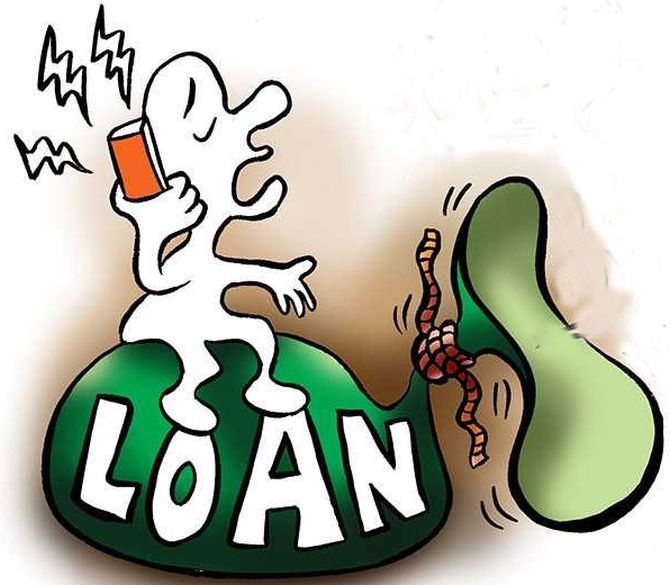With liquidity crunch hitting operations, many finance companies have put the brakes on sanctions in the third quarter in the aftermath of the IL&FS crisis.
Illustration: Uttam Ghosh/Rediff.com

The impact of the liquidity crunch amid loss of investor confidence has aggravated for non-banking financial companies (NBFCs).
After a 17 per cent year-on-year (YoY) fall in the December 2018 quarter, the amount of loans sanctioned by NBFCs (excluding housing finance companies) dropped by 31 per cent YoY in the March 2019 quarter (Q4) to Rs 1.96 trillion, shows the data by Finance Industry Development Council (FIDC). For 2018-19 (FY19), the amount sanctioned by NBFCs fell by 6 per cent to Rs 9.07 trillion.
With liquidity crunch hitting operations, many finance companies have put the brakes on sanctions in the third quarter in the aftermath of the Infrastructure Leasing & Financial Services (IL&FS) crisis.
FIDC is the self-regulatory organisation for NBFCs registered with the Reserve Bank of India.
Barring gold and consumer loans, all other key segments witnessed decline in the sanction amount in Q4. Long-term loans, commercial vehicle and housing loan segments were majorly impacted.
While long-term loans sanctioned fell sharply by 77 per cent YoY, housing and commercial vehicle segments saw 23-24 per cent fall in sanctions in Q4.
Further, NBFCs sanctioned 9 per cent lower auto loans YoY in Q4.
The above-mentioned categories accounted for over 62 per cent of the overall loans sanctioned by NBFCs during FY19.
According to Mahesh Thakkar, director-general at FIDC, “These sectors (where the sanctioned amount fell in Q4) have huge linkages and employment-generation opportunities (housing, auto, commercial vehicles, etc).
"Thus, liquidity should be provided to NBFCs. Money generated by banks are lying with them and not being passed on to NBFCs.”
Some experts, in fact, also believe that the funding constraint at NBFCs is one of the reasons for weak automobile sales since the past few months.
This is because NBFCs enjoy a higher share in financing automobile purchases.
Default by the IL&FS in September last year and then by Dewan Housing Finance Corporation (repaid within a week after the delay) has led to a loss of confidence for lending to the NBFC space, sharply hitting lending ability or increasing the funding cost of NBFCs.
Lower sanctions would mean lower disbursements and core income in the near term, indicating earnings pressure for NBFCs in the near term.
This could further dampen stock performance of major listed players.
Going ahead, things are unlikely to improve.
“In the June quarter, funding availability remained tight. Thus, sanctions and disbursements by NBFCs are likely to have remained under pressure,” says Anil Gupta, head of financial sector ratings at Icra.
Further, since investors have remained in a wait-and-watch mode in the case of NBFCs, the next six months are likely to be difficult for NBFCs.
Some also believe the debt market will not improve materially.
Industry experts, however, expect some assistance from the Reserve Bank of India and from the government in the upcoming Budget (July 5) to address the liquidity issue.
Shriram Transport Finance Company, Mahindra & Mahindra Financial Services, L&T Finance Holdings, among others, saw 10-26 per cent decline in their respective share prices in 2019 so far (year-to-date).
On the contrary, some pockets such as gold financiers and consumer finance witnessed good investor support.
For instance, the stock of Muthoot Finance (gold financier major) and Bajaj Finance (consumer finance major) gained 19-34 per cent during the same period.











